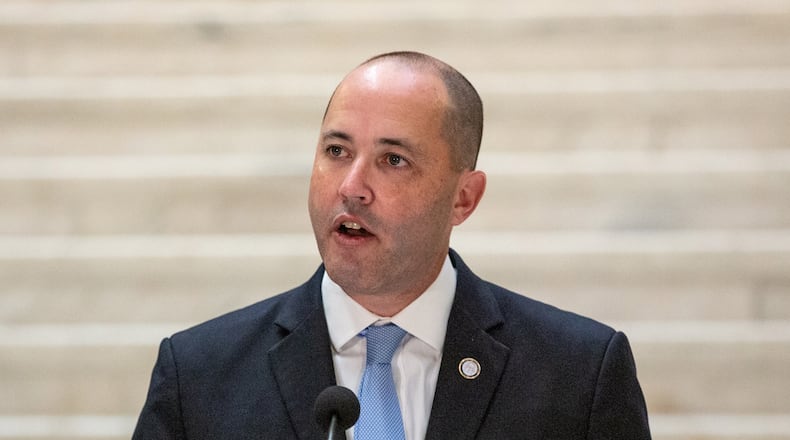At the same time that Chris Carr was working to negotiate the details of a settlement with Johnson & Johnson, the attorney general received thousands of dollars in campaign donations from the organization that lobbies for the pharmaceutical company.
Johnson & Johnson — as well as Cardinal, McKesson and AmerisourceBergen — last summer announced that it had reached a $26 billion settlement agreement with local governments to help pay to fix a nationwide opioid addiction and overdose crisis. Lawyers for each state and local government had to choose to join the settlement. Georgia is expected to receive up to $636 million.
“Georgia is poised to receive hundreds of millions of dollars for desperately needed drug treatment because Chris Carr made the opioid crisis a top priority from day one,” a Carr campaign spokesman said. “He initiated legal action against those who contributed to this crisis, and assembled a bipartisan team of world-class lawyers who helped advise and lead the effort to hold bad actors accountable.”
When asked, his campaign did not answer how Carr reconciles fighting for those suffering from the opioid crisis while receiving money from a lobbying firm that represents opioid manufacturers.
Carr has received $8,600 this election cycle from PhRMA, which lobbies on behalf of Johnson & Johnson and several other drug companies, with $7,600 designated for his primary campaign and an additional $1,000 for his general election. The state ethics commission caps campaign contributions at $7,600 from a single donor for a primary election.
While PhRMA has donated to about three dozen elected officials in Georgia on both sides of the aisle, Carr is the candidate the group has given the most money. PhRMA also donated $25,000 to Gov. Brian Kemp’s leadership committee, Georgians First, which can receive unlimited donations.
PhRMA spokesman Brian Newell said the trade association is not involved in the litigation.
Both Democrats seeking to challenge Carr in the November election said accepting the campaign donations “doesn’t look good” and that they would put policies in place, if elected as attorney general, to deny contributions that could create the appearance of a conflict of interest.
“In campaign contributions like this, whether there is something untoward going on or not, they at least raise the perception that maybe there’s some backroom stuff going on that isn’t good for the state,” said state Sen. Jen Jordan, an Atlanta Democrat and attorney.
Christian Wise Smith, a former member of the Fulton County district attorney’s office, said he would want the public to know he was remaining impartial.
“I think that the office of attorney general has to be one that is above corruption and that you have to assure people that you care more about protecting the citizens of Georgia than you care about protecting your campaign contributors and donors,” Smith said.
Libertarian candidate Martin Cowen said that while it “smells bad and looks bad” for Carr to have received those donations, he said he’s not suspicious of them.
“There’s a lot of people who make the contributions for a lot of reasons,” Cowen said. “And it’s not for me to say, nor do I suspect, that the contribution is any way related to the settlement.”
John Gordan, a Republican challenging Carr in the primary, did not respond to a request for comment.
Carr has made fighting the opioid crisis a central pillar of his campaign platform and his time in office.
“Chris is holding the opioid manufacturers and distributors accountable for their role in fueling the opioid epidemic in Georgia, and he is fighting for Georgia to receive 100% of its share of the national opioid settlement funds,” his campaign website states.
Since the July settlement, Carr has received $6,100 from PhRMA.
Carr also received $1,000 from PhRMA in November 2019, about two months after announcing Georgia would join a settlement with Perdue Pharma. PhRMA lobbied on behalf of Purdue Pharma until that company’s bankruptcy last year.
Pharmaceutical manufacturers AstraZeneca and Pfizer, both of which make opioids, also donated $1,500 and $5,000 to Carr’s campaign, respectively. Pfizer’s most recent donation was in 2017.
Credit: AJC file photo
Credit: AJC file photo
About the Author
Keep Reading
The Latest
Featured





